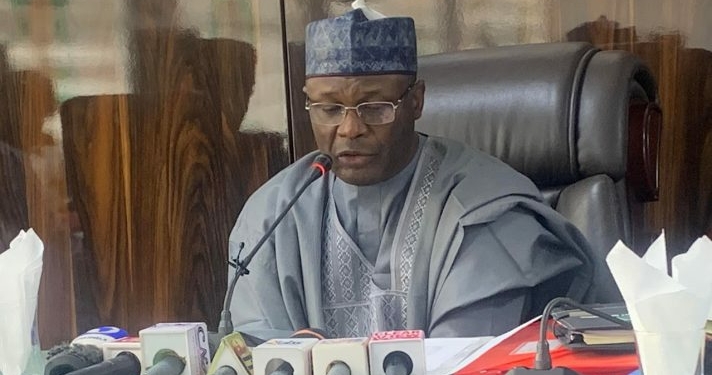Barely three days to the conduct of Presidential and National Assembly elections, Chairman of the Independent National Electoral Commission (INEC) Prof. Mahmood Yakubu has clarified that raw figures of election results would not transmitted electronically by his Commission.
Yakubu made the revelation on Wednesday night at a meeting with leaders of International Election Observers who visited him at his Commission headquarter.
He said Presiding Officers has the mandate to use the Bimodal Voters Accreditation (BVAS) machine to snap
election results documented on the results sheet from each polling unit and upload the photo of the result on the INEC Result Viewing Portal (IRev) for anxious Nigerians to observe.
He said raw figure transmitted electronically was susceptible to hacking.
The INEC Chairman confessed that the election would be conducted under serious challenges which include, security and cash crunch.
He however told his guests that his Commission has consulted widely with relevant financial institution and security agencies and secured their cooperation.
He said: “It confirms that the cards issued by the commission and presented by the voter is genuine and the voter is authenticated using the finger print and where it failed, the facial. Where both fail, the voter can’t vote. That is a matter of law.
“After the process is completed at the polling unit, the image of the polling unit result will be taken by the BVAS and uploaded into what we call the INEC Result Viewing Portal where citizens can see polling unit level results as the processes are completed at polling unit level.
“The difference between what Kenya did in 2015 and what we are doing is that we are not transmitting raw figures for collation. Infact, the law does not allow for electronic collation of results. So, we don’t transmit raw figures because raw figures transmitted online are more susceptible to hacking, while image of a document is not susceptible to hacking.
“We have had the experience of conducting this over a long period of time. We had 105 bye elections and off circle elections using that system of electronic transmission of results. So, we have had some experience. It is a simple process. From anywhere in the world, you can access the portal and see the results of the 105 elections we have conducted since August 2020. These are the functions of the BVAS.
“Like any new technology, it initially presented its own challenges and we kept responding to those challenges. In the last elections we conducted in Ekiti and Osun, the machines performed optimally.
“But since this is the first time we are deploying the machines for national elections, we conducted a mock accreditation exercise which threw up some issues which we have addressed. We are confident that on Saturday, the machines will perform optimally.”
Professor Yakubu acknowledged that there has been tremendous improvement and initiatives to make conduct of elections easier in the country which he attributed to robust legislations.










Discussion about this post